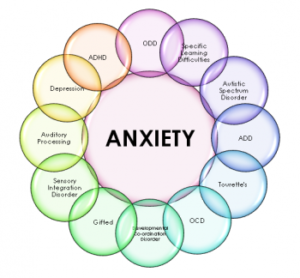Anxiety disorders are a common mental health condition affecting millions of individuals worldwide. It involves excessive worry, fear, and unease that can interfere with daily life. While anxiety is a normal reaction to stress, anxiety disorders are more severe and persistent, causing significant distress.
Types of Anxiety Disorders
There are several types of anxiety disorders, each with distinct characteristics:
Generalized Anxiety Disorder (GAD): Individuals with GAD experience chronic, excessive worry about everyday life events.
Panic Disorder (PD): PD is characterized by frequent panic attacks, unexpected surges of intense fear accompanied by physical symptoms.
Social Anxiety Disorder (SAD): SAD involves an intense fear of social situations that can lead to avoidance and isolation.
Specific Phobias: These involve an irrational fear of specific objects or situations, such as heights, spiders, or flying.
Obsessive-Compulsive Disorder (OCD): OCD causes intrusive thoughts followed by repetitive behaviors, such as handwashing or checking.
Post-Traumatic Stress Disorder (PTSD): PTSD occurs after experiencing or witnessing a traumatic event, leading to flashbacks, nightmares, and severe anxiety.
Causes and Risk Factors
Anxiety disorders have a complex interplay of genetic, environmental, and psychological factors that contribute to their development:
Genetics: Having a family history of anxiety disorders can increase an individual’s susceptibility to developing one themselves.
Brain Chemistry: Imbalances in brain chemicals may contribute to anxiety disorders, affecting the regulation of mood and emotions.
Environmental Factors: Traumatic life events, such as abuse, neglect, or the loss of a loved one, can trigger or exacerbate anxiety disorders.
Personality Traits: Certain personality traits, such as being overly shy or perfectionistic, can increase the risk of developing anxiety disorders.
Medical Conditions: Some medical conditions, such as heart disease or thyroid disorders, can mimic or worsen anxiety symptoms.
Substance Abuse: Chronic use of substances like alcohol or drugs can contribute to anxiety disorders.
Identifying Symptoms
Anxiety disorder symptoms may vary from person to person. However, common signs include:
Excessive Worry: Constant, uncontrollable worry about various aspects of life.
Restlessness: Feeling restless, on edge, or unable to relax.
Panic Attacks: Sudden, intense feelings of fear, accompanied by physical symptoms like rapid heartbeat and shortness of breath.
Sleep Problems: Difficulty falling asleep, staying asleep, or experiencing restless sleep.
Irrational Fears: Having intense and irrational fears of specific objects, situations, or social interactions.
Difficulty Concentrating: Inability to concentrate or feeling easily distracted.
Physical Symptoms: Experiencing physical manifestations such as headaches, stomachaches, muscle tension, or fatigue.
Coping Mechanisms
While anxiety disorders can be challenging to live with, there are various coping mechanisms to help manage symptoms:
Therapy: Cognitive-Behavioral Therapy (CBT) is one of the most effective treatments for anxiety disorders. It focuses on identifying and challenging negative thought patterns.
Medication: Some individuals may benefit from medications such as selective serotonin reuptake inhibitors (SSRIs) or benzodiazepines, which can alleviate symptoms.
Exercise: Engaging in regular physical activity can boost mood, reduce anxiety, and promote better sleep.
Relaxation Techniques: Practices like deep breathing, meditation, and yoga can help calm the mind and induce relaxation.
Social Support: Seeking support from friends, family, or support groups can provide comfort and understanding.
Healthy Lifestyle: Prioritizing self-care by maintaining a balanced diet, getting enough sleep, and avoiding excessive caffeine and alcohol can help manage anxiety.
When to Seek Professional Help
While coping mechanisms can be beneficial, it may be necessary to seek professional help when:
Symptoms significantly interfere with daily activities or relationships.
Feelings of anxiety become overwhelming and uncontrollable.
Suicidal thoughts or self-harm behaviors arise.
Substance abuse or addiction co-occurs with anxiety disorders.
Remedies and coping strategies are insufficient in managing symptoms.
Conclusion
Anxiety disorders are a prevalent mental health condition that affects millions worldwide. Understanding the different types of anxiety disorders, their causes, and risk factors can help individuals seek appropriate help. By utilizing coping mechanisms such as therapy, medication, exercise, relaxation techniques, and social support, individuals can effectively manage their anxiety and lead fulfilling lives.

